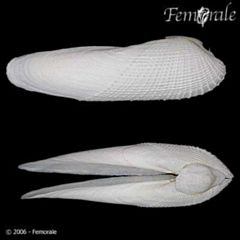Project 5159: S. Monari. 2009. Phylogeny and Biogeography of Pholadid Bivalve Barnea (Anchomasa) with Considerations on the Phylogeny of Pholadoidea. Acta Palaeontologica Polonica. 54 (2):315-335.
Abstract
The paper examines the systematics, phylogeny and biogeographical history of Barnea (Anchomasa), which is one of the most abundant and diversified of modern pholadid bivalves. The range of morphology of its distinctive characters and comparisons with other pholadoidean taxa are described in detail. An extensive cladistic analysis based on morphological characters at genus and subgenus levels allowed the inclusion of B. (Anchomasa) into the phylogeny of Pholadoidea and the establishment of its most appropriate taxonomic position. The analysis confirms that Barnea s.s. and B. (Umitakea) are its closest relatives and that the morphological similarities to other taxa are mainly due to plesiomorphies. The fossil record and the data on the present-day distribution contributed to trace the biogeographical history of B. (Anchomasa). The present-day biogeography is marked by the disjunct distribution of species. Species are distributed mainly either along the Atlantic and Pacific coasts of the American continent (American group) or in the Indo-West Pacific region (Indo-West Pacific group). Both these groups have distinct morphological features and biogeographical structures. The fossil record and the known geodynamic scenario suggest a relationship of direct derivation between the Indo-West Pacific group and a stock of north-eastern Atlantic to Paratethyan species. This reflects a vicariant event related to the closure of the connection between western Tethys and the Indian Ocean in the middle Miocene. The American group presumably arose from the European stock during the Late Pliocene by dispersal towards the eastern coasts of North America and rapid southward diffusion. A relative differentiation within the American group is probably related to the last phases of emergence of the Panama Isthmus. The cladistic analysis also gives suggestions for the reconstruction of the phylogeny of the superfamily Pholadoidea. It confirms the interpretation of several characters sustained by previous authors. However, it also shows remarkable differences to the previous taxonomic arrangements. Pholadinae includes only taxa having the protoplax and it appears to be the sister-group of a major clade composed mainly of two groups, namely Martesiinae-Jouannetiinae and Xylophagainae—Teredinidae. The Martesiinae are paraphyletic whereas the obligate wood-boring Xylophagainae and Teredinidae form a well-supported monophyletic group.Read the article »
Article DOI: 10.4202/app.2008.0068
Project DOI: 10.7934/P5159, http://dx.doi.org/10.7934/P5159
| This project contains | Matrices |
|---|---|
Download Project SDD File | Total scored cells: 179 Total media associated with cells: 0 Total labels associated with cell media: 0 |
| Characters | |
| Total characters: 12 Total characters with associated media: 0 Total characters with media with labels: 0 Total character states: 25 Total character states with associated media: 0 Total character states with media with labels:0 Total unordered/ordered characters:12/0 |
Currently Viewing:
MorphoBank Project 5159
MorphoBank Project 5159
- Creation Date:
27 March 2024 - Publication Date:
27 March 2024
Authors' Institutions ![]()
- University of Padova
Members
| member name | taxa |
specimens |
media | chars | character
| cell scorings (scored, NPA, "-") | cell
| rules | ||||||
| Shreya Jariwala Project Administrator | 16 | 1 | 1 | 12 | 0 | 0 | 179 (179, 0, 0) | 0 | 0 | 0 | ||||
Taxonomic Overview for Matrix 'M29747' (16 Taxa)
| taxon | unscored cells |
scored cells |
no cell support |
NPA cells |
"-" cells | cell images | labels on cell images |
member access |
| [1] † Talona explanata Taxon name last Modified on 03/27/24 | 1 | 11 | 11 | 0 | 0 | 0 | 0 | 1 |
| [2] † Cyrtopleuropsis orbignyana Taxon name last Modified on 03/27/24 | 3 | 9 | 9 | 0 | 0 | 0 | 0 | 1 |
| [3] † Cyrtopleura (scobinopholas) costata Taxon name last Modified on 03/27/24 | 0 | 12 | 12 | 0 | 0 | 0 | 0 | 1 |
| [4] † Pholas (pholas) dactylus Taxon name last Modified on 03/27/24 | 0 | 12 | 12 | 0 | 0 | 0 | 0 | 1 |
| [5] † Pholas (monothyra) orientalis Taxon name last Modified on 03/27/24 | 0 | 12 | 12 | 0 | 0 | 0 | 0 | 1 |
| [6] † Barnea (barnea) ustjurtensis Taxon name last Modified on 03/27/24 | 0 | 12 | 12 | 0 | 0 | 0 | 0 | 1 |
| [7] Barnea (barnea) candida Taxon name last Modified on 03/27/24 | 0 | 12 | 12 | 0 | 0 | 0 | 0 | 1 |
| [8] † Barnea (anchomasa) parva Taxon name last Modified on 03/27/24 | 0 | 12 | 12 | 0 | 0 | 0 | 0 | 1 |
| [9] † Barnea (anchomasa) ujratamica Taxon name last Modified on 03/27/24 | 0 | 12 | 12 | 0 | 0 | 0 | 0 | 1 |
| [10] † Barnea (anchomasa) palmula Taxon name last Modified on 03/27/24 | 3 | 9 | 9 | 0 | 0 | 0 | 0 | 1 |
| [11] † Barnea (anchomasa) dumortieri Taxon name last Modified on 03/27/24 | 3 | 9 | 9 | 0 | 0 | 0 | 0 | 1 |
| [12] † Barnea (anchomasa) cylindrica Taxon name last Modified on 03/27/24 | 3 | 9 | 9 | 0 | 0 | 0 | 0 | 1 |
| [13] † Barnea (anchomasa) truncata Taxon name last Modified on 03/27/24 | 0 | 12 | 12 | 0 | 0 | 0 | 0 | 1 |
| [14] † Barnea (anchomasa) subtruncata Taxon name last Modified on 03/27/24 | 0 | 12 | 12 | 0 | 0 | 0 | 0 | 1 |
| [15] † Barnea (anchomasa) manilensis Taxon name last Modified on 03/27/24 | 0 | 12 | 12 | 0 | 0 | 0 | 0 | 1 |
| [16] † Barnea (anchomasa) similis Taxon name last Modified on 03/27/24 | 0 | 12 | 12 | 0 | 0 | 0 | 0 | 1 |

